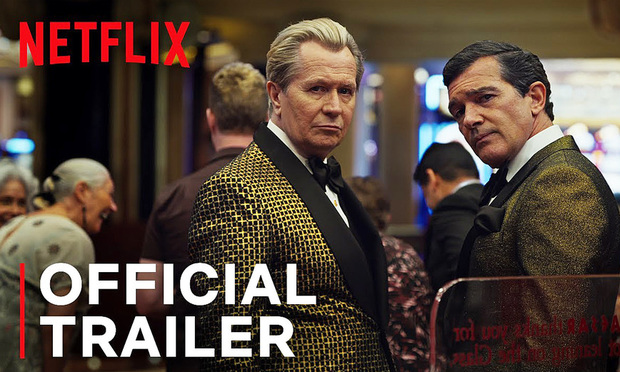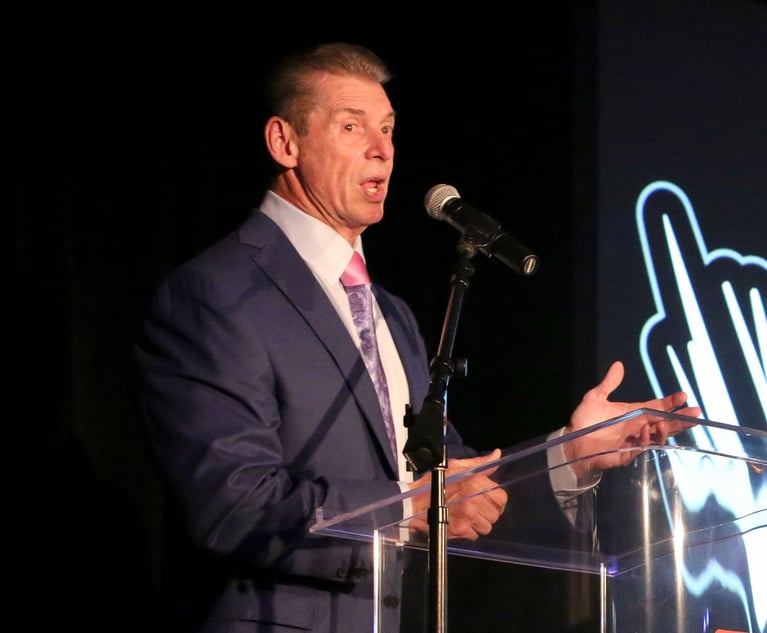Panama Papers Lawyers Sue Netflix in Conn. for Defamation, Seeking to Block New Movie
The founders of now-infamous Mossack Fonseca—formerly one of the world's biggest offshore law firms—sued Netflix for defamation, seeking to stop the release of the movie 'The Laundromat.'
October 17, 2019 at 12:01 AM
5 minute read
The original version of this story was published on Litigation Daily
 The Laundromat, Official Trailer, Netflix
The Laundromat, Official Trailer, Netflix
First the good news: What 67-year-old lawyer from Panama wouldn't want to have Antonio Banderas—mainstay of multiple 'Sexiest Man Alive' lists—play you in a movie?
But apparently that's cold comfort to Ramon Fonseca—not to mention his law partner Jurgen Mossack (rendered on the silver screen by Gary Oldman, who won an Academy Award last year for playing the decidedly un-sexy Winston Churchill).
The duo are the founders of now-infamous Mossack Fonseca—formerly one of the world's biggest offshore law firms, until a whistleblower in 2016 leaked 11.5 million of the firm's internal documents in the so-called Panama Papers scandal.
Basically, it was every law firm's worst nightmare times 10. The resulting disclosures laid bare the offshore tax havens used by the super-rich, as well as dozens of prominent politicians from around the world.
On Tuesday, Mossack and Fonseca sued Netflix in Connecticut federal court for defamation, invasion of privacy, trademark infringement and false advertising. They've asked the court for an injunction to stop the movie "The Laundromat" from being released via streaming by Netflix on Friday.
 The Guardian calls the movie, which also features Meryl Streep, "whip-smart" and "fiendishly entertaining." But if you watch the trailer (which proclaims that the film is "Based on some real shit"), it's easy to see why Mossack and Fonseca aren't happy about how they're depicted.
The Guardian calls the movie, which also features Meryl Streep, "whip-smart" and "fiendishly entertaining." But if you watch the trailer (which proclaims that the film is "Based on some real shit"), it's easy to see why Mossack and Fonseca aren't happy about how they're depicted.
"Defendant defames and portrays the plaintiffs as ruthless uncaring lawyers who are involved in money laundering, tax evasion, bribery and/or other criminal conduct," wrote their lawyer, Stamford, Connecticut-based solo Stephan Erich Seeger.
Mossack and Fonseca are facing criminal charges in Panama and an ongoing FBI investigation in the United States. As a result, Seeger argues that the movie could prejudice potential jurors.
"Once the cat is out of the bag, it is impossible to put it back without the consequence of tainting a verdict," Seeger wrote. "This is especially true where the cat is named 'Laundromat' and the charges would include money laundering."
(Er, if the cat had a different name, like Mittens, would that be OK?)
Seeger argues that a "worldwide audience including potential jurors in a Southern District prosecution, could easily echo the views of influential movie reviewers (which include false accusations and misrepresentations), well before they are ever exposed to real evidence."
He continued, "This problem is writ even larger when the influences that come to bear upon such minds include the false and defamatory message of famous directors, supplemented by words that roll off the tongues of decorated academy award winning actresses such as Meryl Streep. The message is hard to forget, however unsubstantiated the claims may be, and this leaves the potential defendant(s) without a viable remedy where Justice is expected most."
Seeger argues that the movie imputes crimes like drug cartel murders and Russian-gangster money laundering to Mossack, Fonseca and their law firm. "The implications and innuendo converge to cast plaintiffs in the light of mastermind criminals whose crimes include, but are not limited to, murder, bribery, money laundering and/or corruption."
Also (though I'm not so sure this counts as a top grievance) Mossack and Fonseca complain that Netflix uses their law firm's logo without permission.
Netflix, which is represented by Tom Ferber and Michael Adelman of Pryor Cashman and local counsel James Healy of Cowdery & Murphy, points out that the film "has already been exhibited for weeks at film festivals and in cinemas."
In other words, Mittens is long gone from the bag.
In a motion to dismiss, the Netflix lawyers argue that while the plaintiffs are not entitled to any injunctive relief, "this court does not need to reach the merits of plaintiffs' motion, however, because plaintiffs do not meet the requirements of the Connecticut long-arm statute necessary for the court to exercise personal jurisdiction over Netflix."
That is, the movie was shot in California, Florida and Nevada and edited in California, where Netflix in headquartered. The people responsible for creating and marketing the project work in Netflix's Los Angeles office. The film has not been theatrically distributed in Connecticut, nor are there plans to do so.
As for Mossack and Fonseca, they don't live in Connecticut, have an office in Connecticut or conduct business in Connecticut, the Netflix lawyers argue. "[I]t appears that the sole reason this action was filed in this state is because plaintiffs' counsel is based in Connecticut. But the convenience of a plaintiff's counsel is not entitled to any weight in the venue analysis."
"Connecticut has no particular interest in having this case heard here, as neither the plaintiffs nor defendant has any significant connection to the state," they continued in urging the court to dismiss the complaint or transfer it to the Central District of California.
This content has been archived. It is available through our partners, LexisNexis® and Bloomberg Law.
To view this content, please continue to their sites.
Not a Lexis Subscriber?
Subscribe Now
Not a Bloomberg Law Subscriber?
Subscribe Now
NOT FOR REPRINT
© 2025 ALM Global, LLC, All Rights Reserved. Request academic re-use from www.copyright.com. All other uses, submit a request to [email protected]. For more information visit Asset & Logo Licensing.
You Might Like
View All
SEC Puts Beat Down on Ex-Wrestling CEO Vince McMahon for Not Reporting Settlements
3 minute read

With SDNY Stay Lifted, Sex Trafficking Civil Suit Against Vince McMahon, WWE Gets Green Light
3 minute read
'Systemic and Pervasive'?: DiCello Levitt Alleges WWE Child Sexual Abuse Scandal
3 minute readTrending Stories
- 1St. Jude Labs Sued for $14.3M for Allegedly Falling Short of Purchase Expectations
- 2'Ridiculously Busy': Several Law Firms Position Themselves as Go-To Experts on Trump’s Executive Orders
- 3States Reach New $7.4B Opioid Deal With Purdue After SCOTUS Ruling
- 4$975,000 Settlement Reached After Fall on Sidewalk
- 5'Where Were the Lawyers?' Judge Blocks Trump's Birthright Citizenship Order
Who Got The Work
J. Brugh Lower of Gibbons has entered an appearance for industrial equipment supplier Devco Corporation in a pending trademark infringement lawsuit. The suit, accusing the defendant of selling knock-off Graco products, was filed Dec. 18 in New Jersey District Court by Rivkin Radler on behalf of Graco Inc. and Graco Minnesota. The case, assigned to U.S. District Judge Zahid N. Quraishi, is 3:24-cv-11294, Graco Inc. et al v. Devco Corporation.
Who Got The Work
Rebecca Maller-Stein and Kent A. Yalowitz of Arnold & Porter Kaye Scholer have entered their appearances for Hanaco Venture Capital and its executives, Lior Prosor and David Frankel, in a pending securities lawsuit. The action, filed on Dec. 24 in New York Southern District Court by Zell, Aron & Co. on behalf of Goldeneye Advisors, accuses the defendants of negligently and fraudulently managing the plaintiff's $1 million investment. The case, assigned to U.S. District Judge Vernon S. Broderick, is 1:24-cv-09918, Goldeneye Advisors, LLC v. Hanaco Venture Capital, Ltd. et al.
Who Got The Work
Attorneys from A&O Shearman has stepped in as defense counsel for Toronto-Dominion Bank and other defendants in a pending securities class action. The suit, filed Dec. 11 in New York Southern District Court by Bleichmar Fonti & Auld, accuses the defendants of concealing the bank's 'pervasive' deficiencies in regards to its compliance with the Bank Secrecy Act and the quality of its anti-money laundering controls. The case, assigned to U.S. District Judge Arun Subramanian, is 1:24-cv-09445, Gonzalez v. The Toronto-Dominion Bank et al.
Who Got The Work
Crown Castle International, a Pennsylvania company providing shared communications infrastructure, has turned to Luke D. Wolf of Gordon Rees Scully Mansukhani to fend off a pending breach-of-contract lawsuit. The court action, filed Nov. 25 in Michigan Eastern District Court by Hooper Hathaway PC on behalf of The Town Residences LLC, accuses Crown Castle of failing to transfer approximately $30,000 in utility payments from T-Mobile in breach of a roof-top lease and assignment agreement. The case, assigned to U.S. District Judge Susan K. Declercq, is 2:24-cv-13131, The Town Residences LLC v. T-Mobile US, Inc. et al.
Who Got The Work
Wilfred P. Coronato and Daniel M. Schwartz of McCarter & English have stepped in as defense counsel to Electrolux Home Products Inc. in a pending product liability lawsuit. The court action, filed Nov. 26 in New York Eastern District Court by Poulos Lopiccolo PC and Nagel Rice LLP on behalf of David Stern, alleges that the defendant's refrigerators’ drawers and shelving repeatedly break and fall apart within months after purchase. The case, assigned to U.S. District Judge Joan M. Azrack, is 2:24-cv-08204, Stern v. Electrolux Home Products, Inc.
Featured Firms
Law Offices of Gary Martin Hays & Associates, P.C.
(470) 294-1674
Law Offices of Mark E. Salomone
(857) 444-6468
Smith & Hassler
(713) 739-1250










